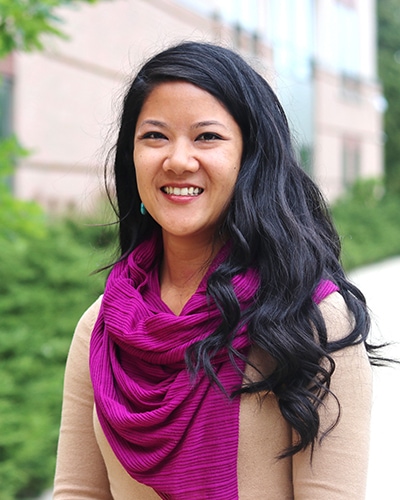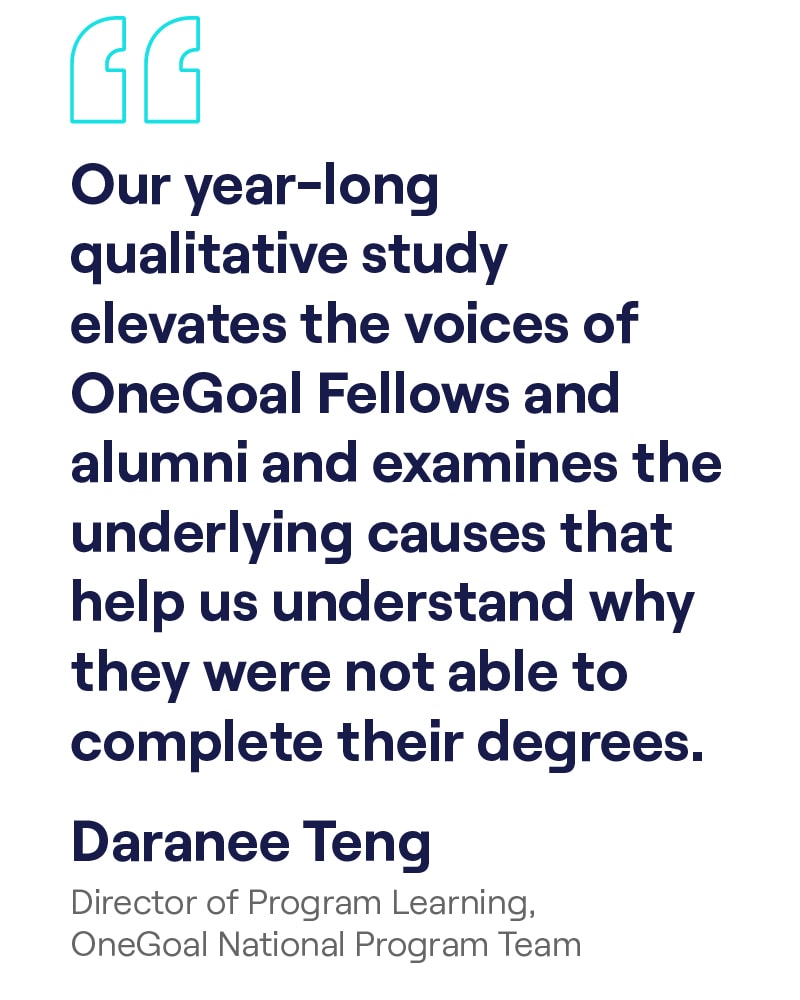Researcher Explains Equitable Approach to Root Causes Study
By Daranee Teng
January 6, 2022
OneGoal Director of Program Learning gives a rare behind-the-scenes look at her research process. Our most recent study looks at what root causes prevent students from completing their degrees. Daranee explains the intention behind the study, the challenges of conducting qualitative research with OneGoal alums, and how the research process and subsequent findings are informing program innovations.
When we hear the word “data” in the postsecondary access and success field, we often think of numbers such as GPAs, test scores, and graduation rates. This quantitative data helps guide important decisions as we design and refine educational programs and resources for first-generation students. Numerical data also helps us communicate our impact to our community partners and funders. However, a key data source often missing from these conversations is the students’ voices for whom our programs are designed.
Qualitative data enables us to gain insight into the complex behaviors, lived experiences, nuanced perspectives, and unique ideas of those we seek to better understand. Qualitative data provides a fuller picture of the story behind the statistics we often see and helps explain the “why” behind numeric outcomes. An essential tenet of an equity-based approach to educational research is the centrality of experiential knowledge, which acknowledges that personal narratives recounting the lived experiences of individuals from historically excluded communities are legitimate forms of knowledge necessary for understanding and challenging systemic inequity(1).
As the sole staff member at OneGoal whose role is fully dedicated to qualitative inquiry to inform continuous program improvement, I greatly value the perspectives and insights that emerge from speaking directly with our most important stakeholders — our Fellows and alumni. My favorite part of this job is listening as students share their hopes, dreams, stories, and experiences.

Daranee Teng, Director of Program Learning at OneGoal.
In July 2020, we embarked on a qualitative study to better understand the root causes preventing students from completing their postsecondary degrees. We know that students from low-income communities are three times less likely to earn a college degree than their peers from high-income areas(2). Our year-long qualitative study elevates the voices of OneGoal Fellows and alumni and examines the underlying root causes that help us understand why they were not able to complete their degrees.

Conducting a study of this nature was not without its challenges and limitations. Our unenrolled alumni are our most difficult-to-reach population at OneGoal. As a three-year program, OneGoal supports Fellows during their junior and senior years of high school and for a full year after high school graduation. As the length of time since a student completed the OneGoal program increases, the more likely it is that we have outdated contact information for them on file. Our learnings from the difficulties encountered during alumni outreach efforts for this study have informed a data collection pilot designed to gather up-to-date contact information and more complete enrollment, persistence, and completion data on thousands of our OneGoal alumni across the country.
Despite the hurdles faced with securing accurate contact information, we were able to hear from 75 OneGoal alumni and I personally spoke with 40 of them. The ongoing global pandemic meant countless hours spent conducting interviews via Zoom or phone calls. While almost all of the students I spoke with had stopped out before the pandemic, we know that without meaningful interventions and comprehensive support, the degree divide will only widen with the onslaught of challenges brought by COVID-19 that disproportionately negatively impact low-income communities and people of color. Alumni who had stopped out and re-enrolled in school spoke candidly about the difficulties of sharing a laptop with their siblings and other family members, not having a quiet place to study, and struggling with the abrupt transition from in-person to online learning.
Beyond the hardships created by COVID-19, the quotes you’ll see in the accompanying research brief speak to the overwhelming obstacles that first-generation students face in a system that was not designed for them to succeed. The majority of alumni interviewed for this study identified their family members as their greatest sources of support for navigating the challenges presented by the pandemic that threatened their success. As educators, we have a critical responsibility to listen to and learn from what our students tell us.
I was grateful to conduct this study to bring student voices to the forefront. Their charge to us in the movement for equity is clear. None of us can win alone. But together, by cultivating strong partnerships, by expanding support for students as they map out their journeys according to their own definitions of success, by equipping students with the knowledge they need to make informed decisions, and by continuing to elevate student voice to inform curriculum and program improvements, we can gain the momentum we need to ensure that all students can achieve their highest postsecondary aspirations.
Go deeper and read the full Root Causes Analysis, available to download now.
(1) Yosso, T. J. (2005). Whose Culture Has Capital? Race Ethnicity and Education, 8, 69-91. https://doi.org/10.1080/1361332052000341006
(2) Kena, G., Musu-Gillette, L., Robinson, J., Wang, X., Rathbun, A., Zhang, J., Wilkinson-Flicker, S., Barmer, A., and Dunlop Velez, E. (2015). The Condition of Education 2015 (NCES 2015-144). U.S. Department of Education, National Center for Education Statistics. Washington, DC. Retrieved [24 August 2021] from http://nces.ed.gov/pubsearch.


